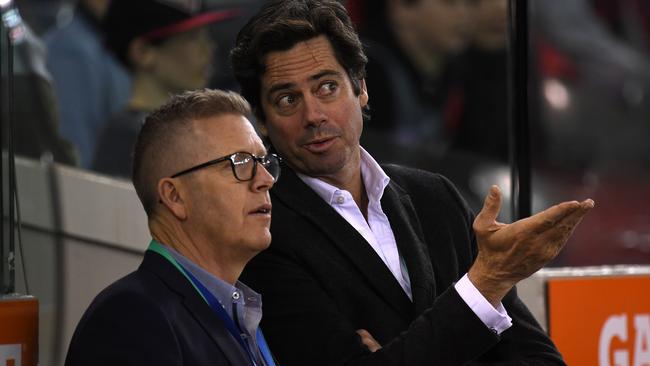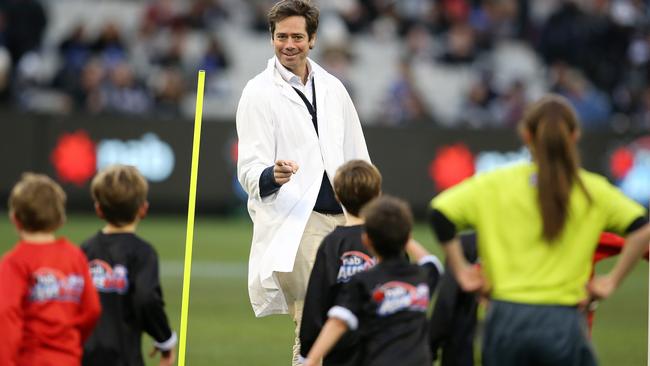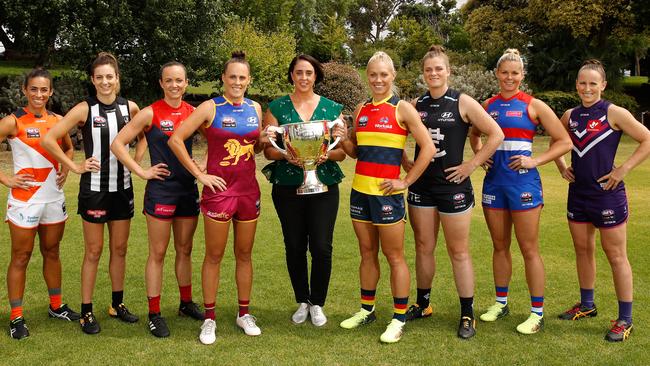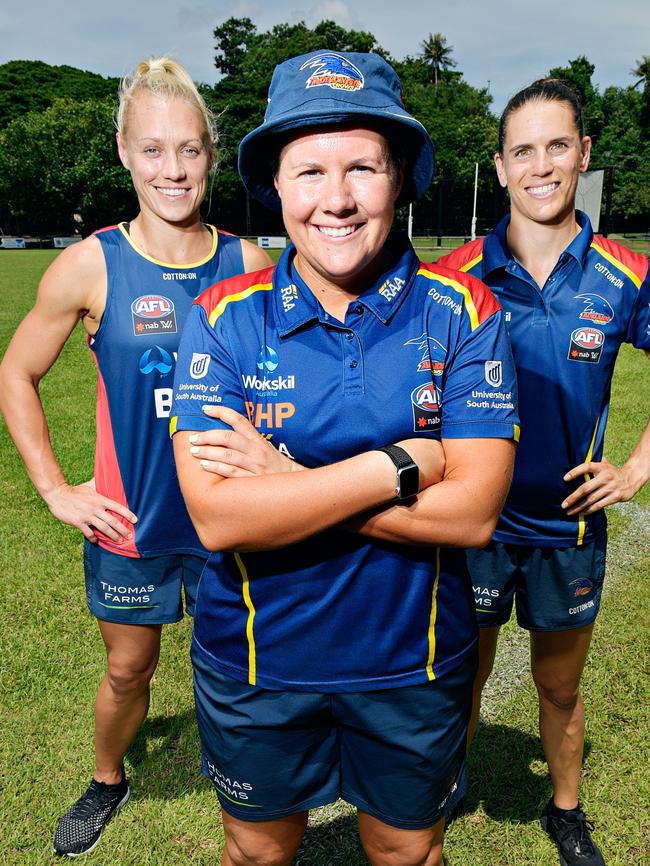AFL boss Gillon McLachlan is reluctant to stand on complacency as he seeks to make Australian football even better
GILLON McLachlan changed the game forever two years ago by giving women their own top-shelf league. Now, in the first of a three-part series, the AFL chief tells Michelangelo Rucci how he is about to change the men’s game with a new rule book.
- Rucci’s Roast: Sign up for your exclusive newsletter here
- AFL integrity unit looks at Crows camp
- Blight supports rule changes
- Rucci: Review of old games might provide greatest lesson
GILLON McLachlan has just had his staff count a record 6,894,770 football fans click the turnstiles in the AFL home-and-away season. It is a significant result for a sport that has spent much of the smashing its own brand with questions on the “look of the game”.
And even with this strong public appeal — that would make many other Australian sporting leaders envious — McLachlan is pushing ahead with rule changes to keep the spectators coming as Australian football prepares for greater competition in the entertainment field.

“Can’t get complacent,” says McLachlan.
“You can always look at opportunities to improve. They might not be there … but you can’t just think that the game is in great health and it can’t be improved.
“We do have the best game in the world. And this year we have seen great examples of the game at its best. But can we see more of these games more often?”
But could the AFL chief executive — now in his fifth year in the big chair at AFL House at the Docklands — be over-reacting?
McLachlan leaves new AFL football boss Steve Hocking’s fingerprints on the long-running debate on changing the rule book. And he also leaves no doubt that the AFL Commission will not endorse change without thinking of the consequences well beyond the AFL’s manicured fields to grassroots football.
“One of Steve’s core responsibilities is to the game itself,” McLachlan said. “He has come in with fresh eyes — and with people for some time expressing concern about congestion.
“Steve has done a wide-ranging — inclusive and consultative — review of our game. He has spoken to the fans, all the clubs, the media and all the other relevant stakeholders in our game.

“Steve is going through what I think is the right process for someone new in the role.”
McLachlan dismisses “external forces” — such as the league’s television partners with falling ratings — who have forced the AFL to review its rule book.
“Zero,” he said. “Steve Hocking initiated the review before the season (and ratings) even started.”
But will the rule changes — that were presented to the AFL Commission last week at a two-day strategy session — survive the ultimate test of AFL coaches and their assistants pulling them apart to find an advantage and create a new headache for the game and Hocking?
“Steve and his team — a large portion of what they are doing — is looking at unintended consequences of any potential change,” McLachlan said. “Coaches will do the best job they can to win — and how to work to the strength and weaknesses of their squad.
“So Steve is assessing how the coaches will respond to (rule) changes.”
Hocking’s final presentation is to be made to the commission next month with the AFL locked to an October deadline for any rule changes.
“And I have been really strong with Steve,” McLachlan said, “that any change has to also contemplate community football not just the AFL. He must consider the implications to community football where they might adopt the change entirely or not.
“But we will not ignore the game outside the AFL.”
ends main
GROWING PAINS FOR AFLW

GILLON McLachlan advanced the agenda for an national women’s football league — the AFLW — from 2020 to 2017. His gamble paid off with a remarkable inaugural premiership season that delivered the flag to Adelaide.
McLachlan now has to negotiate growing pains for the AFLW that is expanding from eight to 10 teams next season — with teams at Geelong and North Melbourne — and the difficult look of all 10 AFLW coaches being men.
McLachlan fast-tracked the AFLW … perhaps faster than the game can manage.
“Three years ago we were having trouble getting AFL clubs to bid for licences,” McLachlan recalled. “Now our biggest issue is not every club has a licence.
“These are nice problems to have. The AFLW has been a success beyond anyone’s expectation.
“The second season of AFLW held up well. History will tell you the second season of a professional, semi-professional women’s sporting league is always tough. But our average crowds were roughly the same as the first year.

“Television ratings were solid with strong and consistent audiences. And if they are the best guides to engagement, we have to be pleased.”
ThBut the absence of a female coach — and the loss of inaugural AFLW premiership-winning coach Bec Goddard at Adelaide — does bring into question if the women’s league will be of women.
“I am okay with that as long as there is a pipeline of development for female coaches,” McLachlan said. “We have had two female senior (AFLW) coaches. As long as there is a pipeline of development of women — and we know they are coming — I am okay.
“That is being worked on.
“And that applies to all areas of the game. We don’t have enough (female) administrators, coaches, senior executives … so there is the player pathway being developed and now we need to work on other pathways for women in football.
“We historically have had 50 per cent of fans at AFL game as women. Other than that women have been under-represented in every other area. We need time and investment.”
McLachlan puts the prospect of AFL-AFLW games being played on the same grounds on the same day as a goal to aim for when all 18 league clubs have both men’s and women’s senior teams.
